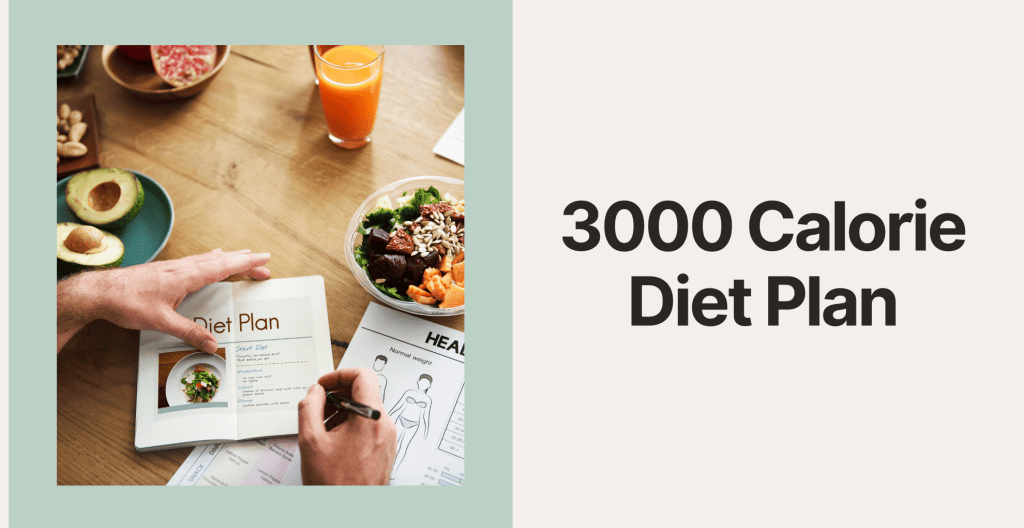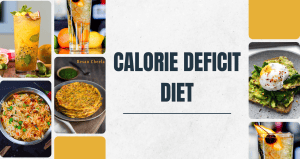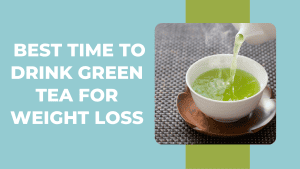Calorie intake is significant when we wish to change our body composition, or simply when we wish to lose or gain weight. A 3000 calorie diet plan is a high-calorie intake meal programme that helps you gain weight and build muscles. Bodybuilders may often follow a distinct 3000 calorie diet plan that is meticulously planned program for every meal. This plan can help you distribute their food intake across five to seven meals, evenly spaced every 2 or 3 hours.
A study suggests that a 3000 calorie meal plan approach aims to prevent overeating and boost the basal metabolic rate (BMR) while helping you gain muscles. In this blog, we have discussed everything about a 3000 calorie diet, who can follow one along with a sample menu of 7 days.
What is a 3000 Calorie Diet Plan?
A 3000 calorie diet plan is a meal strategy designed to give you higher energy required per day. This calorie level is often tailored to individuals with high energy needs, such as athletes, bodybuilders, or those who are willing to be trainer or bodybuilder. The plan includes a balance of macronutrients (carbohydrates, proteins, and fats) and aims to meet nutritional requirements while supporting specific health or fitness goals.
Foods to Include in 3000 Calorie Diet
Maintaining a 3000 calorie diet requires a balanced and nutrient-dense approach. Here’s a list of foods that can help you meet your calorie goals while ensuring a well-rounded nutritional intake:
- Lean Proteins
- Healthy Fats
- Complex Carbohydrates
- Whole Grains
- Dairy and Alternatives
- Fruits and Vegetables
- Protein Supplements
- Healthy Oils
- Seafood
Let us discuss each of these foods that you must include in your 3000 calorie diet plan;
1. Lean Proteins
n a 3000 calorie diet plan, incorporating lean proteins is essential for muscle maintenance and overall health. Options like chicken breast and turkey offer high-quality protein with minimal saturated fat, aiding in muscle repair and supporting a healthy metabolism. Proper portion control is key to meeting protein requirements without exceeding calorie goals.
- Chicken Breast: Packed with high-quality protein, low in fat, and versatile for various recipes.
- Turkey: Another lean protein source, rich in essential amino acids and low in saturated fat.
2. Healthy Fats
Including healthy fats is crucial for nutrient absorption, brain function, and overall well-being. Avocados, nuts, and seeds provide monounsaturated and polyunsaturated fats that support heart health. While these foods are nutrient-dense, moderation is essential to avoid excessive calorie intake. Omega-3 fatty acids from sources like fatty fish (salmon) further enhance the benefits, contributing to a balanced and heart-healthy dietary profile.
- Avocado: A nutrient-dense fruit containing monounsaturated fats, providing energy and supporting heart health.
- Nuts and Seeds: Almonds, walnuts, chia seeds, and flaxseeds are excellent sources of healthy fats and essential micronutrients.
3. Complex Carbohydrates
Complex carbohydrates are a cornerstone of a 3000 calorie diet, offering sustained energy and essential nutrients. Sweet potatoes and quinoa are excellent choices, providing a slow release of glucose, promoting stable blood sugar levels. Prioritizing complex carbs over simple sugars helps maintain energy throughout the day and supports overall metabolic health.
- Sweet Potatoes: High in complex carbs, fiber, and micronutrients, promoting sustained energy release.
- Quinoa: A complete protein source with complex carbs, fiber, and various vitamins and minerals.
4. Whole Grains
Whole grains contribute vital nutrients to a 3000 calorie diet plan. Brown rice and oats, for example, provide fiber, vitamins, and minerals alongside complex carbohydrates. The inclusion of these grains promotes digestive health, aids in satiety, and adds a diverse range of nutrients to the overall dietary profile. Rotating whole grains helps maintain variety in nutritional intake.
- Brown Rice: A good source of complex carbs, fiber, and essential minerals like magnesium.
- Oats: High in fiber, oats provide a steady release of energy and support digestive health.
5. Dairy and Alternatives
Dairy and alternatives play a pivotal role in meeting calcium and protein needs. Greek yogurt and milk are valuable sources that contribute to bone health and muscle function. Opting for low-fat or plant-based alternatives ensures a balance between essential nutrients while controlling saturated fat intake. Including these options in meals and snacks enhances the overall nutritional quality of the diet.
- Greek Yogurt: Packed with protein, probiotics, and calcium for muscle and bone health.
- Milk: A rich source of calcium, vitamin D, and protein, aiding in bone strength and muscle development.
6. Fruits and Vegetables
In a 3000 calorie diet, fruits and vegetables are integral for their rich array of vitamins, minerals, and antioxidants. Bananas, for instance, offer a quick energy boost with potassium for muscle function, while broccoli provides fiber and various micronutrients. Incorporating a colorful variety ensures a broad spectrum of health benefits and supports overall well-being
- Bananas: A quick energy source with potassium, aiding muscle function.
- Broccoli: Packed with vitamins, minerals, and fiber, supporting overall health.
7. Protein Supplements
Supplementing with proteins, such as whey or plant-based options, can be beneficial in reaching elevated protein goals, especially for individuals with increased physical activity. These supplements are convenient for post-workout recovery and can contribute to meeting overall daily protein requirements. However, they should complement, not replace, whole food sources to ensure a well-rounded diet.
- Whey Protein: Convenient for meeting protein goals, especially for individuals with higher protein needs.
- Plant-Based Proteins: Options like pea, hemp, or soy protein can be suitable for those following a vegetarian or vegan diet.
8. Healthy Oils
Healthy oils, like olive oil and coconut oil, serve as important dietary components in a 3000 calorie plan. They provide monounsaturated and medium-chain triglyceride (MCT) fats, respectively, offering cardiovascular benefits and quick energy. Careful portion control is essential to manage calorie intake while enjoying the nutritional advantages these oils offer.
- Olive Oil: A source of monounsaturated fats and antioxidants, beneficial for heart health.
- Coconut Oil: Provides medium-chain triglycerides (MCTs) for quick energy and potential metabolic benefits.
9. Seafood
Incorporating seafood into a 3000 calorie diet plan adds a unique blend of protein, omega-3 fatty acids, and essential minerals. Salmon, rich in omega-3s, supports heart health and provides a quality protein source. Shrimp, on the other hand, offers a lean protein option with relatively lower calorie content. Including a variety of seafood enhances the overall nutritional diversity of the diet.
- Salmon: Rich in omega-3 fatty acids, promoting heart health and providing a quality protein source.
- Shrimp: Low in calories and high in protein, shrimp is a lean seafood option.
Benefits of 3000 Calorie Meal Plan
Adopting a 3000 calorie meal plan can be beneficial for specific health and fitness goals, provided it aligns with individual needs and lifestyles. This level of caloric intake is often suitable for individuals with higher energy requirements, such as athletes, bodybuilders, or those engaging in intense physical training. It can support muscle growth, replenish energy stores, and meet increased metabolic demands. Let us look at the benefits of following a 3000 calorie diet:
- Helps you gain safe weight
- It is Nutrient Sufficient
- Fulfills Energy Needs
- Improved Athletic Performance
Let us discuss each of these benefits of following a 3000 calorie meal plan in detail-
1. Helps you gain safe weight
Gaining weight at a moderate rate of 0.5–2 pounds per week is considered safe and achievable with a well-structured 3000 calorie diet plan. This controlled approach minimizes the risk of uncomfortable side effects like bloating and fluid retention, ensuring a more sustainable and healthier weight gain process.
2. It is Nutrient Sufficient
A 3000 calorie diet plan allows for the inclusion of a diverse range of nutrient-dense foods, providing essential vitamins, minerals, and antioxidants. This ensures that the increased caloric intake supports overall health, promoting the intake of vital nutrients necessary for bodily functions and well-being.
3. Fulfills Energy Needs
Designed to meet the energy demands of individuals with higher activity levels or those undergoing intensive physical training, a 3000 calorie diet plan ensures an adequate supply of energy. This sustained energy helps support daily activities, exercise routines, and other physical demands, promoting overall vitality.
4. Improved Athletic Performance
Athletes often require a higher calorie intake to sustain their training and optimize performance. A 3000 calorie diet plan provides the necessary fuel for enhanced endurance and recovery. The increased energy availability contributes to improved athletic performance, enabling individuals to meet the demands of their training regimens more effectively.
Who should Follow a 3000 calorie Diet?
A 3000 calorie diet is not universally suitable for everyone and should be considered based on individual factors such as age, gender, activity level, and health goals. Here are some individuals who might benefit from or need a 3000 calorie diet:
1. Athletes and Bodybuilders: Individuals engaged in intense physical training, high-performance sports, or bodybuilding often have higher calorie requirements to support muscle development, repair, and overall energy needs. Athletes participating in endurance sports, such as marathon running or triathlons, can burn a substantial amount of calories during training sessions and competitions. For example, a marathon runner may burn around 100 calories per mile, emphasizing the importance of a well-balanced 3000 calorie diet for optimal performance and recovery.
In the realm of bodybuilding, where muscle hypertrophy is a primary goal, a higher caloric intake becomes crucial. This is because the process of building and maintaining muscle mass requires a surplus of calories to provide the necessary energy for intense workouts and to support the protein synthesis required for muscle repair and growth. A 3000 calorie diet becomes a strategic component for bodybuilders to meet these elevated energy demands and achieve their physique goals.
2. Underweight Individuals: Those who are underweight or have difficulty gaining weight may be advised to follow a 3000 calorie diet to achieve a healthy and sustainable weight gain. This can be particularly important for individuals with a fast metabolism or those who struggle with low appetite. A surplus of calories is essential for creating the energy surplus needed to facilitate weight gain.
Moreover, a 3000 calorie diet for underweight individuals should not solely focus on increasing calorie intake but also on nutrient-dense foods to ensure a balanced and healthy approach to weight gain. Including a variety of whole grains, lean proteins, healthy fats, fruits, and vegetables can contribute to not only meeting the calorie target but also providing essential vitamins and minerals necessary for overall well-being.
3. Individuals with High Energy Expenditure: People with physically demanding jobs or those with exceptionally active lifestyles may require a higher caloric intake to meet their energy demands. The four types of activity levels are:
- Sedentary: Minimal physical activity, often involving prolonged sitting or lying down.
- Moderately Active: Engaging in light physical activities and regular, moderate-intensity exercises.
- Active: Leading a lifestyle that includes regular physical activity, meeting or exceeding general recommendations.
- Highly Active: Involving intense and frequent physical activity, often associated with strenuous exercise, demanding jobs, or competitive sports at a high level.
Can 3000 Calorie Diet Plan Help to Gain weight?
Weight gain is a result of consistently consuming more calories than the body expends each day. The appropriateness of a 3000 calorie diet for weight gain depends on factors like activity level and individual body size. Studies suggest that a safe and acceptable rate of weight gain is typically between 0.5–2 pounds (0.2–0.9 kg) per week. It’s important to note that rapid weight gain, especially at a rate beyond this range, may lead to uncomfortable side effects such as bloating, stomach distress, and fluid retention. Athletes, in particular, should be cautious, as rapid weight gain could negatively impact performance during workouts or practices.
Expert Review on 3000 Calorie Diet Plan
A 3000 calorie diet is not suitable for everyone. This high-calorie intake is generally only appropriate for highly active individuals, athletes, or those with specific medical conditions requiring increased energy intake. Experts emphasize the importance of personalized plans based on your specific needs, activity level, and health status. Consulting a doctor or registered dietitian is crucial before starting such a plan to assess your individual needs and potential risks. Here are the potential benefits and possible drawbacks of following a 3000 calorie meal plan:
Potential Benefits:
- For those who genuinely require 3000 calories, a well-planned diet can provide adequate energy and nutrients to support their active lifestyles or health goals.
- It can be beneficial for athletes in training to fuel their performance and recovery.
- It can aid in healthy weight gain under professional guidance, focusing on muscle mass rather than just overall weight.
Potential Drawbacks:
- Consuming more calories than needed can lead to unwanted weight gain and increase the risk of chronic diseases like heart disease, diabetes, and some cancers.
- A poorly planned 3000 calorie diet high in processed foods and sugary drinks can be nutritionally unbalanced and detrimental to health.
- Some individuals may experience digestive issues due to the increased food volume.
References
- Doinea, Mihai. n.d. “(PDF) Analysis upon the influences of calories intake on the human body.” ResearchGate. Accessed February 1, 2024. https://www.researchgate.net/publication/228409868_Analysis_upon_the_influences_of_calories_intake_on_the_human_body
- Huth, Peter J. 2013. “Major food sources of calories, added sugars, and saturated fat and their contribution to essential nutrient intakes in the U.S. diet: data from the national health and nutrition examination survey (2003–2006).” NCBI. https://www.ncbi.nlm.nih.gov/pmc/articles/PMC3751311/
- “International society of sports nutrition position stand: nutrient timing.” 2017. PubMed. https://pubmed.ncbi.nlm.nih.gov/28919842/
- “Recent advances in understanding body weight homeostasis in humans.” 2018. NCBI. https://www.ncbi.nlm.nih.gov/pmc/articles/PMC6039924/
FAQs
Is it possible to eat 3000 calories a day?
Yes, it is certainly possible to consume 3000 calories a day. The appropriateness of this calorie intake depends on factors such as age, gender, activity level, and individual health goals. For some, especially those with high physical activity or specific fitness objectives like muscle building, a 3000 calorie daily diet may be necessary.
What if I eat 3000 calories a day for a month?
Eating 3000 calories a day for a month can lead to weight gain if it exceeds your body’s energy expenditure. A surplus of calories, consistently over time, is likely to result in an increase in body fat. It’s essential to monitor weight changes, body composition, and overall well-being during this period.
Is 3000 calories a lot for one meal?
Yes, consuming 3000 calories in a single meal is not be advisable for most individuals. Such a large meal can lead to discomfort, digestive issues, and fluctuations in blood sugar levels. Moreover, the body is more efficient at utilizing nutrients when they are spread across multiple meals throughout the day. Opting for balanced meals and snacks that distribute calorie intake more evenly supports better digestion, nutrient absorption, and sustained energy levels.
How much weight will you gain by eating 3000 calories a day?
The amount of weight gained by eating 3000 calories a day depends on various factors, including metabolism, activity level, and individual differences in body composition. If 3000 calories exceed your daily energy expenditure, it may lead to weight gain over time. On average, consuming an excess of 500 calories per day can result in about a pound of weight gain per week.








